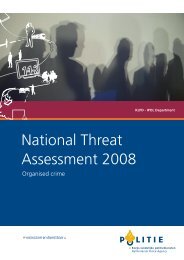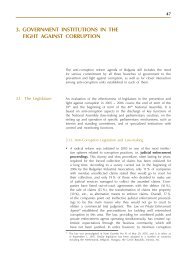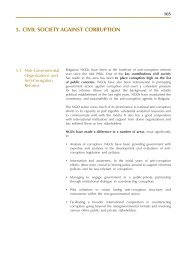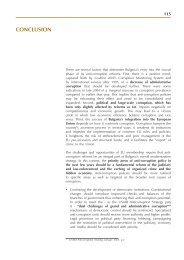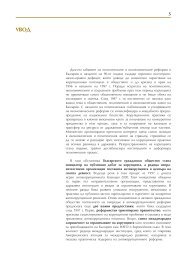Assessing the Effectiveness of Organized Crime Control Strategies ...
Assessing the Effectiveness of Organized Crime Control Strategies ...
Assessing the Effectiveness of Organized Crime Control Strategies ...
Create successful ePaper yourself
Turn your PDF publications into a flip-book with our unique Google optimized e-Paper software.
ecause crime commissions are not designed to develop specific cases, <strong>the</strong>y can take a long-term<br />
approach and examine trends and assess <strong>the</strong> longer effects <strong>of</strong> developments in OC.<br />
<strong>Crime</strong> commissions have <strong>the</strong> power to subpoena witnesses and to hold public hearings. Such<br />
hearings serve as a forum to present <strong>the</strong>ir findings and to mobilize public opinion in order to<br />
encourage institutional responses. In addition, unlike traditional law enforcement agencies,<br />
crime commissions are given immunity through <strong>the</strong>ir enabling legislation and, hence, can operate<br />
without <strong>the</strong> fear <strong>of</strong> lawsuits initiated by aggrieved witnesses (Rogovin and Martens, 1994:392).<br />
Because <strong>the</strong>y are mandated to expose crime ra<strong>the</strong>r than prosecute individuals, crime<br />
commissions, such as those found in several American states, do not need to support <strong>the</strong>ir<br />
conclusions by pro<strong>of</strong> beyond reasonable doubt. The Pennsylvania <strong>Crime</strong> Commission, for<br />
example, adopts <strong>the</strong> civil law standard <strong>of</strong> clear and convincing evidence. Operating with a lesser<br />
standard <strong>of</strong> pro<strong>of</strong> makes it easier to expose OC conditions and individuals, yet protects against<br />
<strong>the</strong> cavalier condemnation <strong>of</strong> persons that even a lesser standard might permit (Rogovin and<br />
Martens, 1994).<br />
<strong>Crime</strong> commissions may possess o<strong>the</strong>r powers not available to traditional law enforcement<br />
agencies. For example, <strong>the</strong> New Jersey Commission <strong>of</strong> Investigation can incarcerate an<br />
immunized witness for refusing to testify. Incarceration <strong>the</strong>n continues until <strong>the</strong> witness agrees<br />
to testify. Some major OC figures were incarcerated for substantial periods for refusing to<br />
testify. The late Angelo Bruno, for example, a member <strong>of</strong> La Cosa Nostra, was imprisoned for<br />
two and a half years—<strong>the</strong> only period <strong>of</strong> incarceration he ever served (Rogovin and Martens,<br />
1994:391).<br />
The Pennsylvania <strong>Crime</strong> Commission’s exposure <strong>of</strong> racketeering in <strong>the</strong> state’s solid waste<br />
industry illustrates <strong>the</strong> value <strong>of</strong> such commissions (Rogovin and Martens, 1994:391). The<br />
commission ga<strong>the</strong>red information and elicited testimony to show that out-<strong>of</strong>-state crime groups<br />
had invested in Pennsylvania waste corporations. The historic pattern <strong>of</strong> operation <strong>of</strong> <strong>the</strong>se<br />
groups indicated that <strong>the</strong>ir entry in <strong>the</strong> waste industry would result in racketeering in<br />
Pennsylvania. The commission recommended regulations to prevent such activity from taking<br />
place and shared key information with federal authorities to facilitate criminal prosecutions and<br />
civil remedies. This type <strong>of</strong> application <strong>of</strong> commission powers provides a broader range <strong>of</strong><br />
options than <strong>the</strong> criminal prosecutions provided for by traditional law enforcement.<br />
The power <strong>of</strong> crime commissions to investigate OC on a systemic level and to facilitate<br />
institutional change is illustrated by <strong>the</strong> Pennsylvania <strong>Crime</strong> Commission’s lengthy investigation<br />
<strong>of</strong> <strong>the</strong> influence <strong>of</strong> OC in <strong>the</strong> city <strong>of</strong> Chester (Rogovin and Martens, 1994:392). Through<br />
informants, electronic surveillance, and private hearings, <strong>the</strong> commission amassed a portrait <strong>of</strong> a<br />
city that was systematically plundered and literally owned by OC. The commission’s work<br />
ultimately led to <strong>the</strong> first change in <strong>the</strong> partisan control <strong>of</strong> Chester’s city government in a<br />
century, an unintended result <strong>of</strong> its fact-finding and public education role.<br />
Ano<strong>the</strong>r example <strong>of</strong> pervasive corruption was found by <strong>the</strong> Knapp Commission in its<br />
investigation <strong>of</strong> <strong>the</strong> New York City Police Department. The commission’s investigation<br />
Research and Statistics Division / Department <strong>of</strong> Justice Canada | 39



